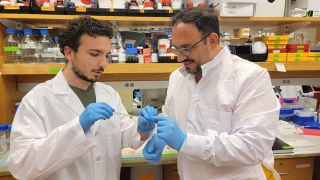 Children's Hospital of Philadelphia (CHOP) researcher Riccardo Gottardi, PhD has been named a "Young Innovator of Cellular and Molecular Bioengineering" by Cellular and Molecular Bioengineering, the official journal of the Biomedical Engineering Society. Dr. Gottardi, who leads CHOP's Bioengineering and Biomaterials (Bio2) lab, was recognized for his research to prevent subglottic stenosis in children.
Children's Hospital of Philadelphia (CHOP) researcher Riccardo Gottardi, PhD has been named a "Young Innovator of Cellular and Molecular Bioengineering" by Cellular and Molecular Bioengineering, the official journal of the Biomedical Engineering Society. Dr. Gottardi, who leads CHOP's Bioengineering and Biomaterials (Bio2) lab, was recognized for his research to prevent subglottic stenosis in children.
Subglottic stenosis occurs when the airway narrows due to an accumulation of scar tissue, which can happen during intubation when bacteria build up and cause chronic inflammation. The condition requires invasive surgery, which comes with risks, particularly in a pediatric population. Dr. Gottardi's lab has investigated modulating the endotracheal microbiome through the use of antimicrobial peptides (AMPs) to destabilize bacterial membranes and reduce inflammation.
Prior studies by Dr. Gottardi's lab used in vitro models to demonstrate that incorporating AMPs into polymer-coated tubes can inhibit bacterial growth and modulate the upper-airway microbiome. In a recent study in Cellular and Molecular Engineering, led by PhD student Matthew Aronson of the Gottardi Lab, the researchers went a step further and used both ex vivo and in vivo models to show how their patent-pending antimicrobial peptide-eluting endotracheal tube (AMP-ET) effectively targeted the local airway microbiota, reducing inflammation and resolving stenosis.
"I am honored to be recognized by Cellular and Molecular Engineering for this exciting and notable award," Dr. Gottardi said. "We are hopeful that our airway innovation will show similar success in human trials, so that we can improve outcomes for intubated pediatric patients."






